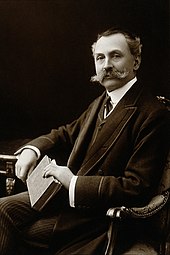James Dundas-Grant
Sir James Dundas Grant (born June 13, 1854 in Edinburgh , † November 13, 1944 in London ) was a British ear, nose and throat doctor .
Life
His father was James Dundas-Grant, a lawyer from Edinburgh, and his mother was Louise Elizabeth Dundas-Grant (née Chapuy). He went to school at Edinburgh Academy and graduated from Dunkirk College in northern France. He enrolled in 1873 as a student at the University of Edinburgh with a Master of Arts (MA). He then studied for a short time at the University of Würzburg in Bavaria before he enrolled at the University of Edinburgh Medical School with an MB CM in Edinburgh in 1876. He then settled in London. He was associated with Poplar Hospital and the Shadwell Lying-in Home at the hospital and was able to visit clinics in London where he was interested in otolarygology. In 1879 he graduated from the University of Edinburgh with honors. His first office as a surgeon at Central London Nose, Throat and Ear Hospital (later Royal National Throat, Nose and Ear Hospital).
Dundas-Grant became a pathologist and then a surgeon at Central London Nose, Throat and Ear Hospital. In 1884 he became a Fellow of the Royal College of Surgeons in Edinburgh (FRCSEd) and six years later of the Royal College of Surgeons in England. He was also a surgeon at Brompton Hospital, West End Hospital for Neurology and Neurosurgery, Freemasons' Hospital, and Sussex Throat and Ear Hospital in Brighton. During the First World War, he worked as a laryngologist in several military hospitals, including the King George Military Hospital, Lord Knutsford's Hospitals and the Russian Hospital for Officers. He also served as a major in surgeon in the reserve regiment of the 24th Middlesex (Post Office) Rifle Volunteers and was a medical officer in the London branch of the National Reserve Corps.
He was a prolific writer who wrote articles on a variety of topics in his field. His expertise was viewed by colleagues as encyclopedic. He had a particular passion for developing surgical instruments, some of which were widely used.
Dundas-Grant had a lifelong passion for music and was a surgeon at the Royal Academy of Music and a surgeon in the Royal Society of Musicians. A popular pastime was conducting an orchestra that he founded.
In 1917 he was appointed director of the hearing clinics of the Ministry of Pensions and senior advisor to the Ministry.
Dundas-Grant has served as Vice President of the Royal Institution, President of the Laryngology Section of the Royal Society of Medicine, President of the Laryngology and Otology Section of the British Medical Association, and President of the Hunterian Society. He became an honorary member of the professional societies in France, Belgium, Germany and the United States. In 1920 he was knighted as Knight Commander of the Order of the British Empire (KBE). He married Helen Frith in 1890. They had two sons. A road accident in 1944 took its toll.
Fonts (selection)
- with Andrew Maitland Ramsay, H. Lawson Whale and Charles Ernest West: Injuries of the eyes, nose, throat and ears . London 1915, OCLC 944716251 .
Web links
| personal data | |
|---|---|
| SURNAME | Dundas-Grant, James |
| BRIEF DESCRIPTION | British ear, nose and throat doctor |
| DATE OF BIRTH | June 13, 1854 |
| PLACE OF BIRTH | Edinburgh |
| DATE OF DEATH | November 13, 1944 |
| Place of death | London |
